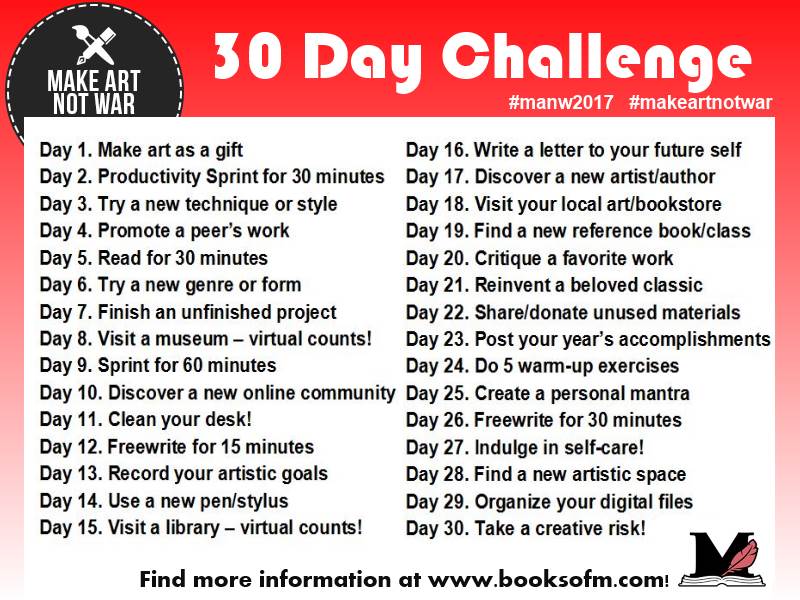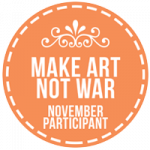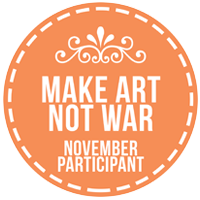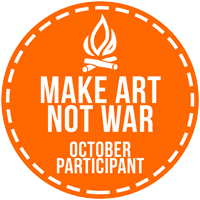
The news sucks. What’s more, it’s not just the news, because so many people are affected by what’s happening — and there’s a lot going on. If you’re an artist of any stripe, you may feel unmotivated right now. Why make art when things are so awful? It might even feel selfish. But, right now, we’re in danger of losing two things: ourselves and our ability to help others either through our art or by falling into depression. Here’s something I learned the hard way that I want to share with you: sometimes, the best way to help others is to help yourself first, so you have more to give. It’s hard to do that if you’re not doing well yourself, because you’ll burn out emotionally and slow down work-wise. Unfortunately, many of us cannot afford that financially, emotionally, etc. And, if you want to know the truth? If you’re struggling you are not alone. Some people can voice that frustation while others can’t. But, this current state of the world is affecting everyone in so many different ways.
So, how do you keep making art? Have a life despite this crushing social zeitgeist? Plan for the future? I don’t know your personal situation, but I’d like to offer some suggestions to help you retain your focus and stay motivated. Your mileage may vary!
1. Participate in a theme month. Inktober is just around the corner! If you can’t draw with pen and ink, don’t be afraid to modify the requirements to do your thing. Small, motivational themes like flash fiction or knitting squares can help pump up your artistic volume.
2. Set tiny goals. When you’re feeling great and everything’s rolling your way, your normal productivity might be 1,000 words a day. If it’s hard to achieve your typical goals right now, set the bar lower. What you’re looking for is consistency. After you accomplish those tiny goals, then raise them up bit by bit until you’re back up to speed.
3. Change your morning routine. I started doing this a few weeks ago, and it’s made a huge difference. First, I make the bed. Then, I go for a walk, and following that over coffee I write my morning pages. While sometimes morning pages are challenging due to work constraints, identifying things I do in the morning before work helps keep me grounded.
4. Try meditation. I tend to do this at night, and I’m not great about getting into a practice. I tend to do this during yoga, which I know I don’t do enough of. Heh. However, I have other friends who swear by this. There’s a few apps you can try that are perfect for beginners, including Headspace.
5. Maintain your creative space. If you’ve been following my blog, you know that my office has been… Well, a disaster. I get halfway through cleaning it up, and I dive into another project… Then poof! It all goes to hell. I spent a solid week going through stuff again, this time assigning smaller projects and goals to the tasks I didn’t finish. Having a clutter free space makes a huge difference! I now have a functional office and, what’s more, I don’t feel like I need to drop what I’m doing to clean it up.
6. Revisit your To-Do list methodology. Okay, so the trick I found was to have separate lists for home, work, and personal. I keep them all in a dot matrix notebook separated by tabs. What separating the lists has done, is keep clear categorizations of my tasks by generic subject. This allows me to have a visible, running track record of what I’m doing (or not as the case may be)! There are apps, too, that can help you with this including Wunderlist and a fun list-turned-game called Habitica.
7. Plan to reconnect. Are there people you haven’t talked to in a while? Friends, family, or peers? Acquaintances you’ve meant to write? Instead of putting that off, turn names into items on your To Do list and reconnect. If you’re not sure where to start, try updating your address book or use your phone to aggregative data. It’s one of the things that’s on my list!
8. Manage your social media time. There’s a couple of online tools you can use on your browser to help you limit distractions. Hard to use them if you have news to share, of course! Other methods of helping you manage your engagements: a timer (or a set time when you’ll check in), limit social media during work hours (see below), only log in during the weekends or special Q&A events, etc. You can also use tools like Hootsuite to wrangle your accounts as well. I find that this is two separate tasks, though, because one is about focusing on the time you log in, while the other is about managing your content.
9. Schedule regular work hours. This is a tip I picked up from Robin D. Laws. Freelancers like myself often taxed with working long or even irregular hours. One method of dealing with motivation is to “go to work”. A 9 to 5 schedule may be unrealistic for you, but I recommend career-minded artists to seriously treat your art as a job — because it is a job. The more you value what you do as an artist, the stronger your motivation will be to continue making art.
10. Check out pro/semi-pro organizations. Organizations like the SFWA can be incredibly valuable to you, because they allow you to connect with other like-minded individuals. While they’re not for everyone, they can be a wonderful way to feel part of your genre or field. Plus, they can help you fill in the gaps in your knowledge. Many of them have resources and downloads to help artists.
11. Schedule a mini-retreat. If you need to get away and completely change your environment, consider doing just that! Often, a retreat can be cost prohibitive so here are some other ideas: go analog and have fun camping, buddy up and visit a friend you haven’t seen in a while, check out deals in off-peak travel times (e.g. Tuesday through Thursday),
12. Take a workshop or class. Many, many authors like Cat Rambo and Writing the Other have online workshops for writing that are of variable fees. YouTube! has a fantastic selection of hands on art classes and tutorials you can dive into as well. Plus, there are workshops you can apply to, such as Launch Pad, Viable Paradise, etc. or workshops at conventions, too.
13. Try a new medium or genre. Sometimes, to get a fresh perspective, you have to get out of your comfort zone. If the words just aren’t coming out, turn your artistic self upside down. If you design and write games, try your hand at a novella. If you normally digitally paint, try singing. New methods of making art are beneficial in other ways, too, because as you try something new it allows your core focus to rest a bit and helps shake up your creative mind.
14. Set Quarterly “New Year’s” Resolutions. One of the things I learned with my Make Art Not War 2017 Challenge, was that most participants dropped off in March. Knowing this, why not set a quarterly resolution instead? By taking that same “I will” or “I pledge” resolution and breaking it off into quarterly increments, you’ll have a better chance accomplishing it.
15. Write a Letter to Your Future Self. What do you want to do as an artist? And, more importantly, why do you want to make art? It can be hard to think of yourself sometimes, which is why I suggest writing a heartfelt letter that only you will read. Why the future? One of the things I’ve found, is that you need to give yourself something to look forward to otherwise you’ll burn out. Setting goals and resolutions do accomplish that, but a letter is about how you feel. It’s about your hope, your desires, your wishes–which are all important to making art.
16. Find an Artistic Hero. There’s something to be said for finding an author, artist, etc. whose career you’d like to emulate. Mind you, and I do say this with gravitas, do this in a non-creepy or problematic way. Finding a hero doesn’t mean hounding or expecting them to help you, nor does it mean this person is necessarily pure and perfect in their own right. All artists are human, after all, and we are flawed. What it does mean, is that you identify positive attributes of an artist who exhibits what you’d like to do. This is another source of inspiration to help you through your blocked state.
17. Identify a personal mantra. Speaking of hope, one of the common mantras I hear is: “Fake it ’til you make it.” I tend to revise that statement to: “Fake it ’til you become it.” One of my personal faves is “I got this!” Then, write that sucker down and post it above your monitor. Remember: YOU GOT THIS.
18. Make art as gifts. The holidays are a great time to give your art as gifts. Yes, I do think it’s appropriate, and yes I absolutely think it’s an awesome idea! If you’re not comfortable with this, consider making your own cards instead. It’s a little bit of “you”, and you still get the benefit of giving a piece of yourself.
19. Donate a percentage of your sales to charity. If you’re a pro artist and you’re selling your work, think about setting up a charitable donation where ten percent of the proceeds goes to charity. You could do this for an item or across the board. If you have the means, this can help you feel as if you’re doing something to help. There’s a ton of charities out there to pick from. For artist-facing, you could check out Hero Initiative or the RPG Creators Relief Fund for starters.
20. Assign Dollars to Your Time. In this list, I’ve covered emotional and mental aspects of the work. This last tip is about the financial aspects of your work, whether you’re a hobbyist or a professional. If none of the above tips help, you might consider taking a fiscal approach and assign yourself an hourly rate, rate per piece, per word, etc. By assigning a financial value to everything you do, you can get a sense of where you’re placing your efforts.
21. Use a Productivity Timer or Timesheet. Along those lines, you can categorize and track where you’re spending your time with a productivity timer like Toggl or MyHours. You may need to account for the time spent inputting data into the app, but to get your shit together give yourself three months. The first month sees how you’re spending your time, the second is to adjust for any changes you make, and the third is to see your time in practice.
22. Change your deadline visibility. If you are tracking deadlines with milestones or other dates on your calendar, try using colored lines with markers or (my favorite) Stabilo pens on a physical calendar or planner to indicate when a project stops and starts. That can help you see, very clearly, how many projects you’ve got going on at the same time. Another method that can help you, is to try your hand at bullet journaling to get a sense of how much you have on your plate.
23. Buddy up! Find someone to check in with on a semi-regular basis. The goal of a buddy is for you to help each other. This type of arrangement works great if you have boundaries and expectations clearly established ahead of time. A mutually beneficial arrangement like this works wonderfully if your goals are aligned and you’re in a similar frame of mind for your creative efforts. It can also work well if you don’t create in the same field, because the whole point of a buddy is to be a cheerleader for each other. Plus, you get to learn something new and interesting from someone else!
24. Interview other Artists – One way to break past the isolation and frustration you’re experience is to interview other artists. Interviewing other artists for your blog or social media also offers both of you content; they get to promote their stuff, and you get to highlight them for your readers. Interviews can also be tailored or small, too, you could do three-question interviews as opposed to ten or fifteen. Or, alternatively, you could simply reach out privately and ask other artists how they’re dealing with the current political atmosphere.
25. Get Professional Help – If you’ve tried everything there is to try and you’re still not able to produce art, please consider getting professional help. Be kind to yourself! It matters! That may be a sign something else is wrong, and I encourage you to get the care you need.
Mood: Hovering in my chair.
Caffeinated Beverages Consumed: A LOT.
Work-Out Minutes Logged Yesterday: Pokewalk.
In My Ears: Air conditioner
Game Last Played: Final Fantasy VIII
Book Last Read: Loads for work.
Movie/TV Show Last Viewed: Last Week Tonight With John Oliver
Latest Artistic Project: Make Art Not War 2017 Challenge and Rules
Latest Releases: Over the Edge for Dungeons & Dragons 5th Edition, Dagger of Spiragos for Scarred Lands.
Current State of Projects: Read my latest project update. New project update coming when I get time.





